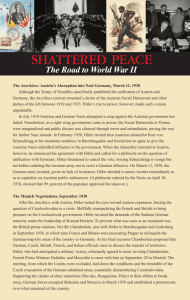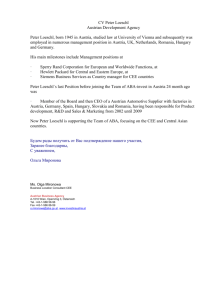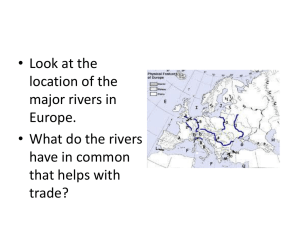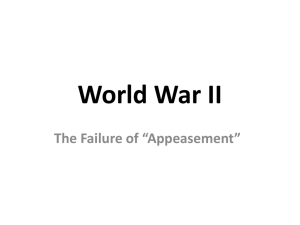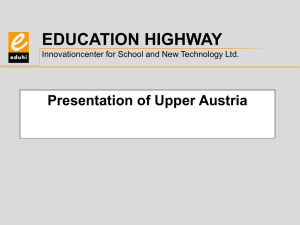(c) crown copyright Catalogue Reference:CAB/24/275 Image Reference:0001
advertisement
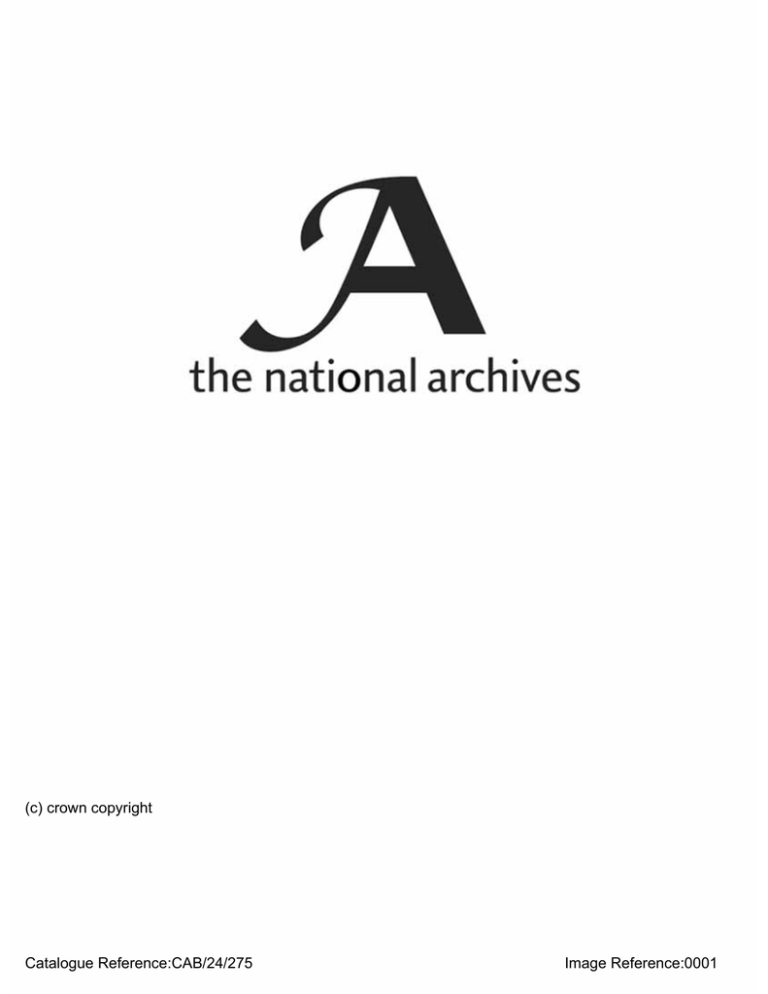
(c) crown copyright Catalogue Reference:CAB/24/275 Image Reference:0001 [(THIS DOCUMENT IS THS PROPERTY OF HIS BRITANNIC MAJESTY S GOVERNMENT.) 1 EGRET. ;.P. 44 (38). OowNp, C A B I N S T. AUSTRIA, PROPOSALS OF THE FRENCH GOVERNMENT. The accompanying copy of a memorandum handed in by the French Ambassador on 18th February, 1938, is circulated to the Cabinet by direction of the Prime Minister, who has instructed that it should be placed on the Agenda Paper for the- Meeting of the Cabinet to be held on Wednesday next, 23rd February (Signed) 0 M.P.A. HANKEY. Secretary to the Cabinet. , Whitehall Gardens, S.V/.1, 21st February, 1938. TRANSLATION. Memorandum left with the Secretary of State for Foreign Affairs by the French Ambassador on February 18th, 1938. The Memarche 1 made at Berlin by the British and French Ambassadors as a result of the arrangements which have just been reached at Serchtesgaden between the Governments of the Reich and of Austria, has not succeeded in producing sufficiently precise indications of the real scope of the Austro-German agreement. If in these circumstances England and France now remain silent, this attitude will not fail to be interpreted in Berlin as a tacit admission of resigned acquiescence on the part of the Western Powers. Not only would the German Government be justified in regarding this as a recognition of the accomplished fact, but also in believing that the Governments of London and Paris are prepared to let things go still further. This would be opening the way to new initiatives, doubtless of a still more serious nature. No illusions are possible about the consequences of the Berchtesgaden resolutions. Herr Hitler's remarks to the Austrian Chancellor and the language of the German press are equally significant of the state of mind of the Ftihrer and of those around him. Germany has possibly not succeeded at the first attempt in obtaining in Austria all she wanted, but we may rest assured that she will return to the charge. Will she wait until she has definitely settled the Austrian problem before tackling the Czechoslovak questionv Nothing can yet be statea with certainty on this point, but there can be no doubt that her decisions will be prepared in the same secrecy ana carried out with the same brutality as have marked the Berchtesgade interview. Doctor Goebbels himself has, moreover, for a long time past publicly defended these methods, Great Britain and Finance have already on more than one occasion made an offer to the Government of the Reich to open far-reaching negotiations in which peace guarantees in Central Europe would have to be balanced by concessions to Germany in other spheres. always evaded these proposals. The Berlin Government have In fact their intention is as is now proved to us, that they should settle themselves, by unilateral decisions, those questions which they regard as essential, and that conversations with London and Paris should not take place until after the final establishment of German hegemony in the centre of Europe, when rlerr Hitler will consequently find himself in a position to speak in even more categorical terms than he is able to do today. The Western Powers should, not deceive themselves as to the credit which they will retain in Central Europe and elsewhere if Germany's next ultimatums are accepted. If, on the contrary, they are rejected, and if the Czechoslovak Government show themselves determined to resist, all the consequences should be foreseen. The President of the Council and the Minister for Foreign Affairs of France had the opportunity during the FrancoBritish talks in November, 1937, to recall what are France engagements in this connexion. It is thus important, in the interests of European peace itself, whilst there is 1 yet time, to stop the execution of the German plan by combined action on the part of Great Britain and France, The Austrian Chancellor has not resigned himself to capitulation, and Herr Hitler did not at Berchtesgaden reach all the objectives which he has set before himself. The situation therefore is not yet finally lost; but it is incontestable that Austrian resistance depends upon the support which she can find in London and Paris, Italy having abdicated her responsibility from the moment Bignor Mussolini preferred to sacrifice the position of his country in Central Europe rather than renounce his Mediterranean ambitions-. Herr Hitler has formally indicated to Doctor Schuschnigg that he counts upon the inaction of the Governments of London and Paris, and has gone so far as to claim - contrary to the truth -. that his policy towards Austria and Czechoslovakia received encouragement from Lord Halifax's remarks. without ignoring the difficulties of the British Government in undertaking in advance any formal engagements, it is surely not impossible at last to open the eyes of Herr Hitler and his collaborators to the obligations which their anxiety to maintain peace in Central Europe may eventually impose upon Great Britain and France; it ought to be equally possible to undertake a concerted study between London and Paris of the most appropriate means for backing up the resistance of Vienna and Prague. In the opinion of the French Government, a very clear warning should be given to the German Government; in this respect it is questionable whether the last "demarche' made by the British Ambassador in Berlin was sufficiently of this character. The Austrian Chancellor had asked that a demarche , 1 1 preferably joint, or at the least concerted, should be made in Berlin by the two Ambassadors 0 The French Government hold such a gesture to be essential in the near future, and they consider that the Government of the Heich should be warned: (l) that the legitimate anxiety of Doctor Schuschnigg to safeguard Austrian independence will not, in the opinion of Great Britain and France, allow him to go any further; (2) that the real and not merely verbal independence of Austria constitutes one of the major interests of European peace, and that the British and French Governments could not be indifferent spectators of any new attempts v destined to destroy it; (3) that in general we cannot tolerate any coup de main' 1 or act of war likely to bring into question the territorial 'status quo' in Central Europe, and that in that case these events would meet with opposition on the part of the Western Powers 0 Apart from such a warning, it would be equally desirable for the Governments of London and Paris to consider whether all means of facilitating the "rapprochement' of the Danubian Btates have been exhausted; whether certain possibilities are not still open in this connexion in agreement with Vienna and Prague; and whether, in particular, these could not be found in the economic and financial sphere. However desirable Italian co-operation may still be, this is of a very uncertain character in view of the circumstances in which Signor Mussolini has just abandoned Doctor bchuschnigg to his fate; it therefore remains very doubtful whether the co-operation of the Duce can be obtained at present. However this may be, if such co-operation still remains possible, it would undoubtedly be easier to obtain it if Franco-British action did not appear to be subordinated to it. The more resolute we appear, the less we shall seem to submit passively to events, and the greater will be the chances of bringing Italy back to us some day. The French Ambassador would be glad to learn the views of the British Government on the foregoing considerations. ALBERT GATE HOUSE, February 18th, 1938.
